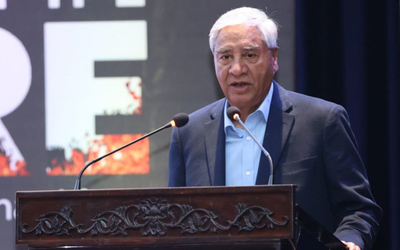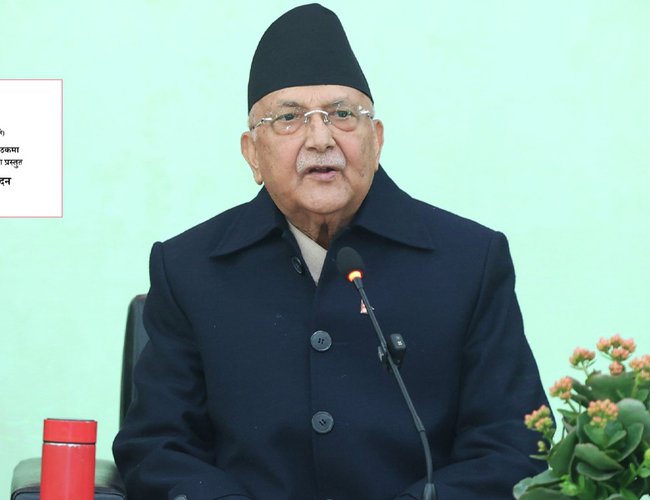
As it was said by the late Professor Leo Rose, domestic politics determines the foreign policy of bigger countries, and external factors determine the domestic politics of smaller countries like Nepal, which remains valid.
Despite having a two-thirds majority in the House of Representatives, which is enough to amend the constitution, the current coalition government led by CPN-UML leader KP Sharma Oli seems fragile and unstable.
From Prime Minister Oli to his comrades in the party and the top leaders of the ruling alliance Nepali Congress, all have been saying that this is a stable and strong government since the day it was formed.
However, Nepalese citizens have yet to see any sense of a stable government in reality. Despite several efforts, the economy is still in bad shape with no sign of quick recovery.
While Prime Minister Oli has maintained his domestic constituencies in balance, the same cannot be said for his foreign policy. From day one of his tenure, some of his actions and decisions have remained unbalanced. PM Oli’s government's inability to manage its foreign relations, particularly with neighbors, is creating problems.
Given the foreign relations situation, Nepal’s internal politics is facing uneasy consequences. Although the top leaders of the ruling alliance, including Prime Minister Oli and Nepali Congress leader Sher Bahadur Deuba, have been defending the present coalition, saying that there is no other alternative, their statements have also raised questions.
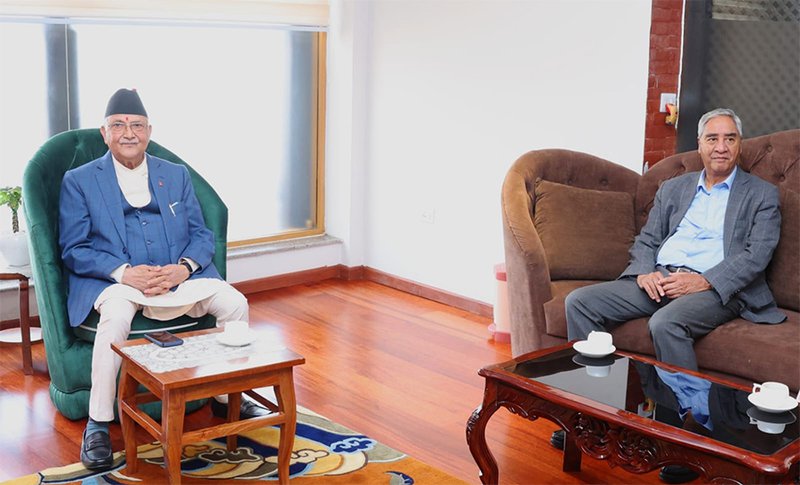
Amid a tense political situation, the ruling CPN-UML and main opposition Maoist Center are convening central committee meetings to determine the political course. Nepal Police's decision to take Rabi Lamichhane's case to court, the
leader of the Rastriya Swantraparty, who has been in police custody for three months on charges of fraud, misuse of cooperative deposits, and money laundering, has prompted both ruling and opposition parties to strategize for the future political landscape. The outcome of whether Lamichhane will be granted bail or remain in custody is being closely watched, as it will have significant implications for both ruling and opposition parties. The release of Lamichhane on bail could bolster the Maoist Center's criticism of the government.
CPN-UML Meeting
During the CPN-UML meeting, discussions ranged from Rabi Lamichhane's case to the expulsion of senior leader Bhim Rawal from the party, with a focus on assessing the implications for the party's future.
In his opening remarks, Prime Minister and CPN (UML) Chairman Oli characterized the widespread criticism against him and the government as reactionary responses, emphasizing that reactionary forces are alarmed by the unity of patriotic, progressive, and democratic forces.
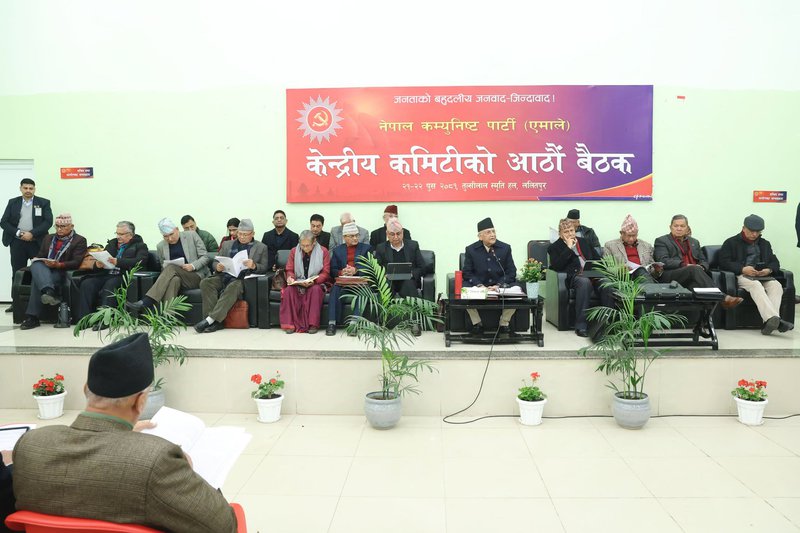
Speaking at the eighth meeting of the central committee of his party, Oli condemned reactionary forces for spreading relentless and unfounded propaganda against his party.
He asserted that opposition groups, threatened by UML’s increasing popularity, are trying to damage its reputation. Oli urged party members to combat these false narratives and focus on strengthening the party at the grassroots level to establish it as a significant force in Nepalese politics.
"We cannot stay silent in the face of unfounded accusations. Silence indicates weakness. We must challenge such claims with evidence and ensure our organizations actively engage with individuals and households," stated the UML chair. "Internal divisions disguised as democracy only weaken the party. We must unite, prioritizing national and party interests under a single policy framework."
Prime Minister Oli also criticized leaders who had rejoiced at the possibility of the UML's decline, noting that they are now facing consequences for their actions.
During the meeting, he presented a 43-page political report covering various topics, such as a new political direction, the importance and reasoning behind the alliance with the Nepali Congress, the obstacles of instability and orchestrated negativity, Nepal's foreign policy in a changing global landscape, an analysis of by-elections, and strategies for establishing a strong national presence.
We must not stay silent in the face of accusations from our opponents. It is a flawed notion to remain quiet. The allegations made by our opponents should be countered with facts. It is important for all our organizations to be proactive and engage with people and households. Emphasis should be placed on ideological work," stated UML chairperson Oli.
He emphasized the need to put an end to factions and chaos within the party, stating that creating factions in the name of democracy will not strengthen the party. "We should focus on the party and country's interests by adhering to a consistent policy rather than being misled."
In the political report presented during the meeting, Chair Oli outlined a new political roadmap and discussed the rationale and opportunities for forming an alliance between UML and Nepali Congress. He assessed the current alliance six months after its formation, discussed the changing global environment and the country's foreign policy, reviewed local by-elections, and emphasized the building of decisive national power.
Since the formation of the new government, there has been a message of political stability, issuance of common policy commitments and resolutions, establishment of structures to facilitate government operations, economic improvements, passage of laws on transitional justice, protection of national interests, maintenance of balanced external relations, resolution of issues in the cooperative sector, and justice for savers. He highlighted that those involved in irregularities have been punished, and there has been an acceleration in development and construction.
Maoist Center Meeting
As the political situation becomes more tense, the central committee (CC) meeting of the main opposition party in parliament, CPN (Maoist Center), has commenced.
Maoist Chair Chairman Pushpa Kamal Dahal 'Prachanda' presented a political and organizational report. In his address to the meeting, Prachanda urged party workers to stay vigilant against any plots against the current constitution and criticized the government led by PM Oli for creating a fragile situation. Maoist Center vice-chair and spokesperson Agni Prasad Sapkota stated that the country has been in a politically and economically challenging situation since the formation of the new coalition government. On the other hand, Nepali Congress leaders are supporting the government, arguing that the two-party coalition is necessary for political stability and economic growth.
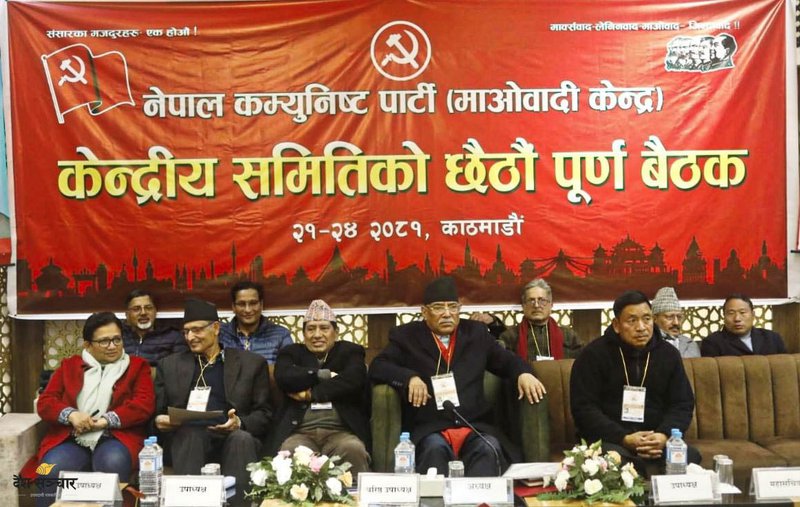
Deputy Prime Minister and Minister for Urban Development Prakash Man Singh emphasized the importance of amending the constitution through consensus with all parties.
During a meeting with party cadres in Bardibas, Singh, who is also a leader of the Nepali Congress, highlighted that the current government was established with the goal of amending the constitution and stressed the need for extensive discussions with all parliamentary parties for a constitutional amendment. Singh emphasized that a stable government is crucial for the country's development and predicted that the current coalition will remain in power until the next House of Representatives election. He also encouraged party cadres to actively participate in expanding the party organization.
The Deputy Prime Minister stated that the current government, comprised of the Nepali Congress and CPN (UML), was established out of necessity. He emphasized that previous governments formed by smaller parties had led to instability and hopelessness among the people due to frequent changes. The current government aims to provide stability and continuity.
Senior leader of the Nepali Congress, Dr. Shekhar Koirala, has also supported the current coalition government, attributing it to the prolonged political instability.
Political Incidents
Just a few days after the expulsion of senior leader Bhim Rawal from the party, former Inspector General of Police (IGP) Sarbendra Khanal has announced his resignation from the CPN-UML.
The CPN-UML has removed senior leader Bhim Rawal from the party and revoked his ordinary membership. Rawal, a former UML vice chair and former home and defense minister, had been without any responsibilities for a long time due to his disagreements with party chair KP Oli.
During the last UML general convention in November 2021, Rawal ran against Oli for the position of party chairperson but was unsuccessful.
A UML secretariat meeting decided to revoke Rawal's party membership after reviewing his series of statements and actions that went against the party's official stance, according to a senior UML leader.
Rawal had objected to the party's decision to accept land donated by Min Bahadur Gurung, the owner of Bhatbhateni supermarket, for the construction of the party's headquarters.
In a Facebook post, Khanal stated that he is no longer affiliated with any political party. Khanal had been absent from the party's official events for a while.
"I understand that there may be confusion about my political affiliation, so I want to clarify that I am not a member of any political party. I am working independently to address local and national issues. I will continue to contribute as much as possible to the well-being of the country and society," he said.
Just six months after his loss in Kathmandu-5, Khanal ran in the by-election in April 2023 as a UML candidate from Tanahun-1. However, he was defeated again, this time by Rastriya Swatantra Party candidate Swarnim Wagle, who received 34,918 votes. Khanal came in third with 8,488 votes.
Pradeep Gyawali, the party's deputy general secretary, stated that these events would not have a significant political impact on the party. "CPN-UML is a large and long-standing party. It is not uncommon for the party to face such situations."
The country's economic situation has improved since the government was formed, and international relations are also strengthening, Gyawali added.Considering all these events, the situation appears fragile and may lead to another phase of prolonged political instability.
- NEPAL-THAILAND: Joint Business Council
- Apr 13, 2025
- BIMSTEC SUMMIT: Nepal’s Stand
- Apr 11, 2025
- IME GROUP: Expands Into Paper Industry
- Mar 24, 2025
- CPN UML: Instigated By India
- Mar 23, 2025
- ADB’S CHIEF ECONOMIST: Nepal Reduces Poverty
- Mar 11, 2025





